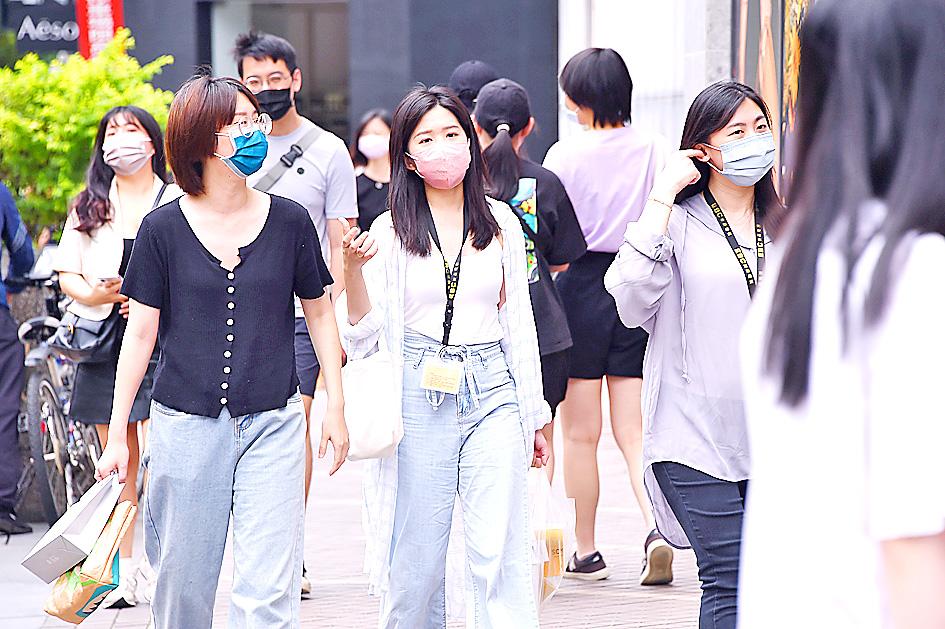People’s willingness to buy a new home hit a 37-month low this month as central bank interest rate hikes dampened market sentiment, a survey released yesterday by Cathay Financial Holding Co (國泰金控) found.
The index of people’s willingness to purchase a new home fell to minus-53.5 this month — the lowest since June 2019 — from minus-52.6 a month earlier, the results showed.
Cathay Financial researchers calculate the index by subtracting respondents who do not plan to buy a new house from respondents ready to do so. An index in negative territory indicates that more respondents do not think it is the right time to buy a home.

Photo: Tu Chien-jung, Taipei Times
The index of people’s willingness to sell a home fell to an 11-month low of minus-12.2, compared with minus-8.3 a month earlier — as respondents showed a lower interest in buying or selling a home.
Cathay Financial said the primary reason for the change is that the central bank has raised interest rates, which increases borrowing costs on a new home.
The survey was conducted between June 1 and June 7, before the central bank on Thursday announced a second rate increase of 12.5 basis points.
Fifty-one percent of respondents said that they would be less willing to buy a home if the central bank raised interest rates again, while 43 percent said they are not interested in buying a new home now.
Only 6.5 percent of respondents said their willingness to buy a new home would not be affected by a rate increase, as their mortgage burden would be relatively low given their current income.
The top three reasons for buying a new home were because of a marriage, an upgrade or an investment, the results showed.

South Korea’s equity benchmark yesterday crossed a new milestone just a month after surpassing the once-unthinkable 5,000 mark as surging global memory demand powers the country’s biggest chipmakers. The KOSPI advanced as much as 2.6 percent to a record 6,123, with Samsung Electronics Co and SK Hynix Inc each gaining more than 2 percent. With the benchmark now up 45 percent this year, South Korea’s stock market capitalization has also moved past France’s, following last month’s overtaking of Germany’s. Long overlooked by foreign funds, despite being undervalued, South Korean stocks have now emerged as clear winners in the global market. The so-called “artificial intelligence

‘SEISMIC SHIFT’: The researcher forecast there would be about 1.1 billion mobile shipments this year, down from 1.26 billion the prior year and erasing years of gains The global smartphone market is expected to contract 12.9 percent this year due to the unprecedented memorychip shortage, marking “a crisis like no other,” researcher International Data Corp (IDC) said. The new forecast, a dramatic revision down from earlier estimates, gives the latest accounting of the ongoing memory crunch that is affecting every corner of the electronics industry. The demand for advanced memory to power artificial intelligence (AI) tasks has drained global supply until well into next year and jeopardizes the business model of many smartphone makers. IDC forecast about 1.1 billion mobile shipments this year, down from 1.26 billion the prior

Chinese artificial intelligence (AI) start-up DeepSeek’s (深度求索) latest AI model, set to be released as soon as next week, was trained on Nvidia Corp’s most advanced AI chip, the Blackwell, a senior official of US President Donald Trump’s administration said on Monday, in what could represent a violation of US export controls. The US believes DeepSeek will remove the technical indicators that might reveal its use of American AI chips, the official said, adding that the Blackwells are likely clustered at its data center in Inner Mongolia, an autonomous region of China. The person declined to say how the US government received

People stand in a Pokemon store in Tokyo on Thursday. One of the world highest-grossing franchises is celebrated its 30th anniversary yesterday.